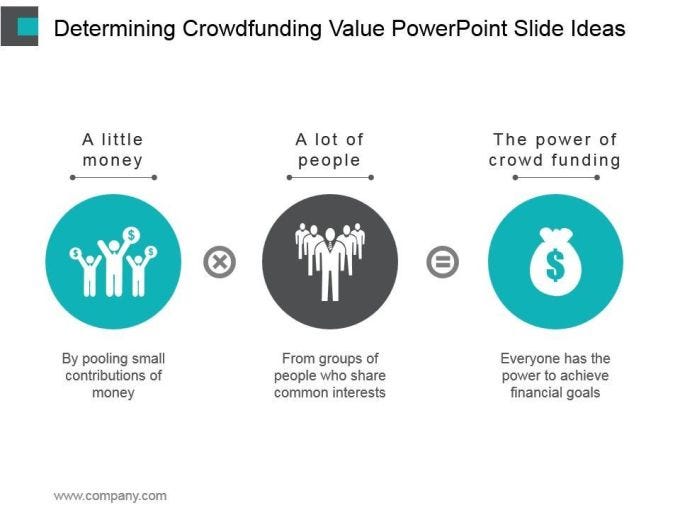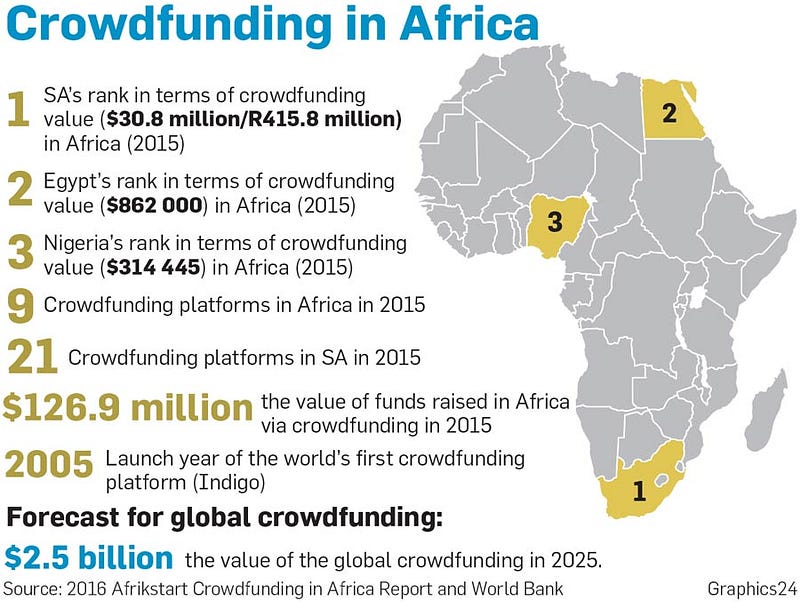Nigeria Proposes Its First Ever Crowdfunding Regulation: Here Is What It Looks Like
Looking to raise capital for your startup through equity crowdfunding in Nigeria? Nigeria ’s Security and Exchange Commission has put in place a draft regulation on crowdfunding, which will allow businesses and startups in the country to raise money from the public. The practice is similar to what South Africa already has. Intergreatme, a South African startup, as an instance, recently succeeded in raising over R32.7 million ($2.2 million) by simply putting up an online request for equity funding on Uprise.Africa and getting overwhelmed by public contributions.

Below are what the Nigerian proposed regulation on crowdfunding is all about.
1. What Categories Of Businesses Can Raise Funds Through Crowdfunding?
- Under the regulation, only MSMEs (Micro, small and medium enterprises) registered as a company in Nigeria with a minimum of two-years operating track record shall be eligible to raise funds through a Crowdfunding Portal registered by the Securities And Exchange Commission.
- Once these funds are raised, the investors are issued corresponding shares, debentures, or such other investment instrument by the startup or MSMEs.
- In this case, the startup or MSMEs wishing to offer or sell securities or other investment instruments in Nigeria does not need to first register such securities such as shares, debentures with the Securities and Exchange Commission.
- However, the startups or MSMEs are only allowed to raise a maximum of the following amounts within a 12-month period: i) The maximum amount which may be raised by a Medium enterprise shall not exceed N100Million ($260k); ii. The maximum amount which may be raised by a Small enterprise shall not exceed N70Million ($182); iii. The maximum amount which may be raised by a Micro enterprise shall not exceed N50Million ($130k).
- The only type of startups totally exempted from the maximum crowdfunding amounts are startups that run digital platforms that connect investors to specific agricultural or commodities projects for the purpose of sponsoring such projects in exchange for a return (such as FarmCrowdy)
- Entities prohibited from raising funds through a Crowdfunding Portal include(a) complex structures (an entity without immediate transparency of ownership and/or control thereby making it difficult to immediately ascertain the beneficial owners of the entity) ; (b) public listed companies and their subsidiaries; (c ) companies with no specific business plan or a blind pool; (d) companies that propose to use the funds raised to provide loans or invest in other entities.
2. How Can Startups Crowfund Under The Regulation?
For startups in Nigeria desiring to raise funds under the crowdfunding regulation, the following steps must be followed:
- The startup must fall under the categories of businesses described above.
- Application for registration as an issuer to a crowdfunding portal (similar to Uprise.Africa in South Africa). A Crowdfunding Portal is a company having a minimum paid-up capital requirement of N100 million which runs a website, portal, intermediary portal, application, or other similar module that facilitates interaction between fundraisers and the investing public.
- Due Diligence is then conducted on the startup or MSMEs by the Crowdfunding Portal. The due diligence exercise will focus on background checks on the startup or MSMEs to ensure fit and properness of the issuer’s board of directors, officers and controlling shareholder(s); (ii) the business proposition of the issuer; and (iii)compliance with all relevant KYC, and AML/CFT regulations as stipulated by the SEC.
- Once the application has been accepted by the Crowdfunding Portal, the startup will then proceed to raise funds from the public, in return for a corresponding shares in the business.
- Every eligible startup or MSMEs seeking to raise funds through a Crowdfunding portal shall issue an offering document, containing information such as (i) warnings to investors (ii) the name and address of the issuer, directors and officers; (iii)holders of more than 5% of the issuer’s securities; (iv)description of the business of the issuer; (v) principal risks facing the business of the issuer; (vi)use of proceeds; (vii) target offering amount (and a deadline to reach the target offering amount); (viii) risk factors; (ix) related party transactions (x) exit options for investors
- Only plain vanilla bonds/debentures, ordinary shares and other investment instruments as may be determined by the Commission can be issued in return for the investors’ funds by the startups or MSMEs.
- The startups or MSMEs are thereafter rigorously monitored by the Crowdfunding Portal. Accordingly, the monitoring will extend to the conduct of issuers and the Portal are empowered to take action against any misconduct of the issuer( the startup or MSMEs); (b)The Portal also monitors issuers to ensure that the fundraising limits imposed on the issuer are not breached. (c) The Portal will also monitor investors to ensure that the investment limits imposed on the investors are not breached and ascertain the classification of prospective investors into relevant investor categories; (e) The Portal is also expected to file reports about the startups or MSMEs with the Commission.
3. What Happens When Investors Invest In Your Startup Through The Crowdfunding Portal?
- Under the Regulation, investors may be allowed to invest in companies hosted on the Crowdfunding Portal subject to the investment limit specified by the Commission from time to time, which in the meantime is that retail investors may not invest more than 10% of their annual income in a calendar year; and that (ii) Sophisticated, High Net worth and Qualified Institutional Investors are not subject to any limits.
- A startup or MSMEs shall not host an offer concurrently on multiple Crowdfunding Portals.
- Investors will be given a cooling off period of 48 hours from the date of close of the offer within which they may withdraw their investment.
- If there is a material adverse change, affecting the project or the issuer, the investors will be given the option to withdraw their investment if they choose to do so within 7 days after the said notification.
- Where an investor cancels the offer or agreement to purchase securities or investment instruments, all funds which may have been debited from or blocked in the account of the investor shall be refunded or released within 48 hours of the request to cancel.
4. How Funds Invested Through The Crowdfunding Platform Are Treated
- Under Nigeria ‘s proposed new crowdfunding regulation, every Crowdfunding Portal shall appoint a custodian who shall establish and maintain a separate trust account for each funding round on its platform with a financial institution registered by the Commission as a Custodian
- Funds invested will be maintained by the Custodian in a trust account and will only be released to the startup or MSMEs after specified conditions are met.
- Funds raised would only be released to the startup or MSMEs if the target amount or the minimum threshold of funds to be raised is met.
- A funding project shall remain live on a Crowdfunding portal for not more than (60 days).
- Where the minimum threshold is not reached at the end of an offer, the Crowdfunding portal shall effect a refund to all investors within 48 hours.
- Investors shall have the right to withdraw any offer or agreement to purchase the securities or investments instruments 48 hours after the closing date stated in the startup or MSMEs’s offering materials.
- Thereafter, an investor is only able to cancel in the event of a material change to the offering.
- Where the funding target is reached, the Crowdfunding portal shall make funds available to the startup or MSMEs within 24 hours of the cooling off period provided that where the Issuer is a public company or a public company by default, the portal shall require evidence of registration of the securities with the Commission prior to transferring the funds to the Issuer (where applicable);
- Where the amount raised meets the minimum amount but falls short of the target amount, the issuer shall provide a revised plan for the proposed use of funds to the investors and the portal. Provided that the underlying project(s) to the proposed use of funds can be downscaled and executed independently without negatively impacting operations of the startup or MSMEs.
- Investors shall not transfer their securities or investment instrument for a period of one year except if a transfer is: (a) to the issuer of the securities or investment instrument; (b) to an institutional investor; or (c) part of an offer for sale registered with the Commission;
- The issuer’s articles of association shall provide for the right of retail investors to withdraw from the company or to sell the stake, in the event that controlling shareholders transfer control of the company to third parties within three years from the conclusion of the offer.
- A crowdfunding portal shall take all reasonable steps and establish measures by which it is able to verify that the proceeds raised from its platform are utilized for the stated purpose.
- For an offer to be successfully completed, the minimum amount indicated in the offering document which must be sufficient to accomplish the business objectives of the issuer must have been subscribed for.
NB:
- Micro Enterprises in Nigeria are those enterprises whose total assets (excluding land and buildings) are less than Ten Million Naira with a workforce not exceeding ten employees.
- Small Enterprises are those enterprises whose total assets (excluding land and building) are above Ten Million Naira but not exceeding One Hundred Million Naira with a total workforce of above ten, but not exceeding forty-nine employees.
- Medium Enterprises are those enterprises with total assets excluding land and building) are above Fifty Million Naira, but not exceeding One Billion Naira with a total workforce of between 50 and 199
employees — Source: SMEDAN Nigeria
Charles Rapulu Udoh

Charles Rapulu Udoh is a Lagos-based lawyer who has advised startups across Africa on issues such as startup funding (Venture Capital, Debt financing, private equity, angel investing etc), taxation, strategies, etc. He also has special focus on the protection of business or brands’ intellectual property rights ( such as trademark, patent or design) across Africa and other foreign jurisdictions.
He is well versed on issues of ESG (sustainability), media and entertainment law, corporate finance and governance.
He is also an award-winning writer.
He could be contacted at udohrapulu@gmail.com


